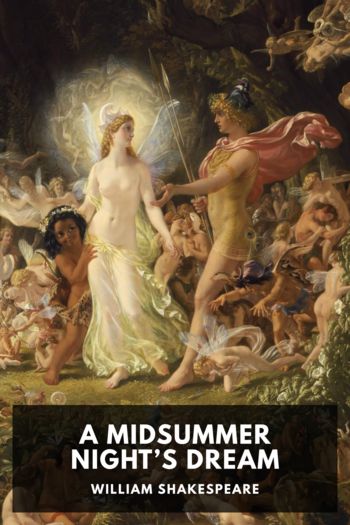Edward III by William Shakespeare (new ebook reader TXT) 📕

- Author: William Shakespeare
Book online «Edward III by William Shakespeare (new ebook reader TXT) 📕». Author William Shakespeare
Go, and the next bough, soldier, that thou seest,
Disgrace it with his body presently:
For I do hold a tree in France too good
To be the gallows of an English thief.
My Lord of Normandy, I have your pass
And warrant for my safety through this land.
Ay, freely to the gallows to be hang’d,
Without denial or impediment:—
Away with him.
I hope, your highness will not so disgrace me
And dash the virtue of my seal-at-arms:
He hath my never-broken name to show,
Character’d with this princely hand of mine;
And rather let me leave to be a prince
Than break the stable verdict of a prince:
I do beseech you, let him pass in quiet.
Thou and thy word lie both in my command;
What canst thou promise, that I cannot break?
Which of these twain is greater infamy,
To disobey thy father, or thyself?
Thy word, nor no man’s, may exceed his power;
Nor that same man doth never break his word
That keeps it to the utmost of his power:
The breach of faith dwells in the soul’s consent:
Which if thyself without consent do break,
Thou art not charged with the breach of faith.—
Go, hang him; for thy license lies in me:
And my constraint stands the excuse for thee.
What, am I not a soldier in my word?
Then, arms adieu, and let them fight that list:
Shall I not give my girdle from my waste
But with a guardian I shall be controll’d,
To say, I may not give my things away?
Upon my soul, had Edward Prince of Wales
Engag’d his word, writ down his noble hand,
For all your knights to pass his father’s land,
The royal king, to grace his warlike son,
Would not alone safe-conduct give to them,
But with all bounty feasted them and theirs.
Dwell’st thou on precedents? Then be it so.—
Say, Englishman, of what degree thou art.
An Earl in England though a prisoner here;
And those that know me call me Salisbury.
To Calice, Salisbury? Then to Calice pack;
And bid the king prepare a noble grave
To put his princely son, black Edward, in.
And as thou travell’st westward from this place,
Some two leagues hence there is a lofty hill,
Whose top seems topless, for the embracing sky
Doth hide his high head in her azure bosom;
Upon whose tall top when thy foot attains,
Look back upon the humble vale beneath,
(Humble of late, but now made proud with arms)
And thence behold the wretched Prince of Wales,
Hoop’d with a bond of iron round about.
After which sight to Calice spur amain,
And say, the prince was smother’d and not slain:
And tell the king, this is not all his ill,
For I will greet him ere he thinks I will.
Away, begone; the smoke but of our shot
Will choke our foes, though bullets hit them not. Exeunt.
The same. A part of the field of battle.
Alarums, as of a battle joined, skirmishings. Enter Prince Edward and Artois. Artois How fares your grace? are you not shot, my lord? Prince EdwardNo, dear Artois; but chok’d with dust and smoke
And stepp’d aside for breath and fresher air.
Breath, then, and to’t again: the amazed French
Are quite distract with gazing on the crows;
And, were our quivers full of shafts again,
Your grace should see a glorious day of this:—
O, for more arrows! Lord! that’s our want.
Courage, Artois! a fig for feathered shafts
When feathered fowls do bandy on our side!
What need we fight and sweat, and keep a coil
When railing crows out-scold our adversaries?
Up, up, Artois! the ground it self is arm’d
With10 fire containing flint; command our bows
To hurl away their pretty-color’d yew,
And to’t with stones: away, Artois, away;
My soul doth prophesy we win the day. Exeunt.
Our multitudes are in themselves confounded,
Dismayed, and distraught; swift-starting fear
Hath buzz’d a cold dismay through all our army,
And every petty disadvantage prompts
The fear-possessed abject soul to fly:
Myself, whose spirit is steel to their dull lead
(What with recalling of the prophecy
And that our native stones from English arms
Rebel against us) find myself attainted
With strong surprise of weak and yielding fear.
Fly, father, fly! the French do kill the French;
Some that would stand let drive at some that fly:
Our drums strike nothing but discouragement,
Our trumpets sound dishonour and retire;
The spirit of fear, that feareth nought but death,
Cowardly works confusion on itself.
Pluck out your eyes and see not this day’s shame!
An arm hath beat an army; one poor David
Hath with a stone foil’d twenty stout Goliahs:
Some twenty naked starvelings with small flints
Hath driven back a puissant host of men,
Array’d and fenc’d in all accomplements.
Mordieu, they quoit at us and kill us up;
No less than forty thousand wicked elders
Have forty lean slaves this day ston’d to death.
O, that I were some-other-countryman!
This day hath set derision on the French,
And all the world will blurt and scorn at us.
Make up once more with me; the twentieth part
Of those that live are men enough to quail
The feeble handful on the adverse part.
Then charge again: if Heaven be not oppos’d,
We cannot lose the day.
Even as a man may do,
That dines at such a bloody feast as this.
No matter, if it be; the count is cast,
And, in the worst, ends but a mortal man.
Good friends, convey me to the princely Edward,
That, in the crimson bravery of my blood,
I may become him with saluting him;
I’ll smile





Comments (0)